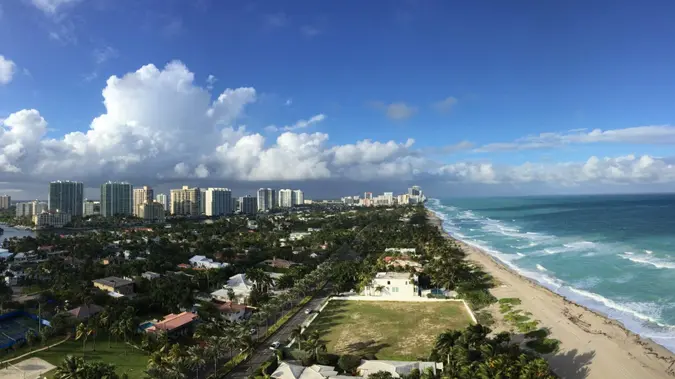Housing Market 2025: 4 Smaller Cities To Consider When Buying a Home

Commitment to Our Readers
GOBankingRates' editorial team is committed to bringing you unbiased reviews and information. We use data-driven methodologies to evaluate financial products and services - our reviews and ratings are not influenced by advertisers. You can read more about our editorial guidelines and our products and services review methodology.

20 Years
Helping You Live Richer

Reviewed
by Experts

Trusted by
Millions of Readers
If you’re shopping for a home, you probably know a lot about the major cities near you. You may even plan to put down your roots in one of them.
However, the large metros in your region aren’t your only options. Smaller cities also have much to offer and may work better for your family and long-term goals. GoBankingRates checked in with a few real estate experts to uncover some of the smaller cities you might want to check out.
You’ll also learn about the pros and cons of small-city living and explore whether the move could be right for you.
4 Smaller Cities for Your Consideration
Many small cities in the country might be the ideal place for you to live. Here are four of them.
Greeley, Colorado
According to Brett Johnson, owner of New Era Home Buyers, prospective homeowners should look at Greeley, Colorado, due to its strong economy, proximity to Fort Collins and Denver and steady price growth. “Greeley has maintained a balance between affordability and long-term value, making it a safer bet for 2025,” he said.
“Ultimately, you want to be in a market that can support growth over time, not just one that looks good today. That’s been a guiding principle in my years of investing across Colorado,” Johnson explained.
Foster, Rhode Island
“Homebuyers should consider purchasing in [a city] that offers a homestead exemption that can help reduce [their] property taxes if they occupy the home as a primary residence,” said Stephanie Amedee, branch manager at Semper Home Loans. If you want a genuinely small-town feel, Amedee mentioned Foster, Rhode Island, which boasts a population of under 5,000.
The city recently implemented the homestead exemption. Depending on the town council’s annual determination, you could see a 20% to 35% reduction in your property’s assessed value, reducing your tax liability.
Ashland, Ohio
According to Seamus Nally, CEO of TurboTenant, many small cities in Ohio are worthy of consideration due to their stability.
“With the ups and downs of the economy nationwide, housing prices don’t seem to be as impacted [in the state] compared to most of the rest of the country,” Nally explained. “And at the same time, the bigger cities in Ohio have been growing pretty significantly with job opportunities, so these areas are really promising not just to invest in but to live in as well.”
When asked to name a specific city homebuyers may want to explore, Nally recommended Ashland. Ashland is about an hour-long drive from Cleveland, making it a relatively easy commute to work, shopping, entertainment and other amenities.
Humble, Texas
Kenya Goodwine, owner of The Royal Agency and certified military residential specialist, recommended that you put Humble, Texas, on your list of cities to evaluate. Humble features affordable houses, with a median home price of just under $360,000. (The national median home price is around $420,000.)
Humble is also growing. The city offers broadening career and educational opportunities, amenities and diversity. Plus, according to Goodwine, Humble provides “a nice tranquil escape from the [big] city” while still being close to it.
Benefits of Small-City Living
Small-city living often offers the following perks:
- Affordable housing (compared to larger cities)
- A tighter-knit community
- More small businesses (fewer chain stores)
- Less crime, traffic and noise
- More green space and cleaner air
Drawbacks of Living in a Smaller City
On the other hand, no area is perfect. Some of the pitfalls of smaller cities can include:
- Fewer jobs and longer commutes (though remote work may help with this)
- Reliance on a car due to limited public transportation (vehicle costs may negate your savings on housing)
- Less access to goods (though online ordering and delivery may mitigate this)
Should You Move To a Small City?
Deciding where to buy a home can be complicated. You should consider your budget, needs, preferences and long-term goals.
A small city could work for you if:
- You want to buy a home now but can’t afford bigger-city prices.
- You can work remotely or don’t mind a longer commute.
- You tend to shop online or don’t mind driving a distance to major retailers.
- You like the peace, safety and sense of community a small city offers.
- You prefer being surrounded by grass and trees over pavement.
Conversely, a small city may not be ideal for you if:
- You’re not in a hurry to buy or can already afford a house in a larger city.
- You need to work in person, don’t want a long commute or don’t own a car.
- You enjoy shopping in person — and walking to stores.
- You’re not interested in knowing your neighbor or becoming part of the community.
- You don’t mind the hustle and bustle of the major metro (you might even thrive on it).
How To Choose the Right Small City
If you’ve decided that small-city living is the way to go, here’s how to choose the right town:
- Set a housing budget — and pledge to stick to it.
- Write down your must-haves and nice-to-haves.
- Ask your family and friends for recommendations based on where they live.
- Get suggestions from real estate professionals who work in the regions you may want to live in.
- Create a short list of potential small cities to consider.
- Rate each small city on your list using criteria such as public school quality, crime statistics, public transportation availability, political inclination, weather patterns, career prospects, social life, shopping options and other data points that are important to you.
- Visit your top choices at different times of day (and times of year, if possible) to get a feel for how they operate.
- Finally, choose a city. If you’re not 100% sure, you can always rent for a while, so it’s less of a commitment.
 Written by
Written by  Edited by
Edited by 

























